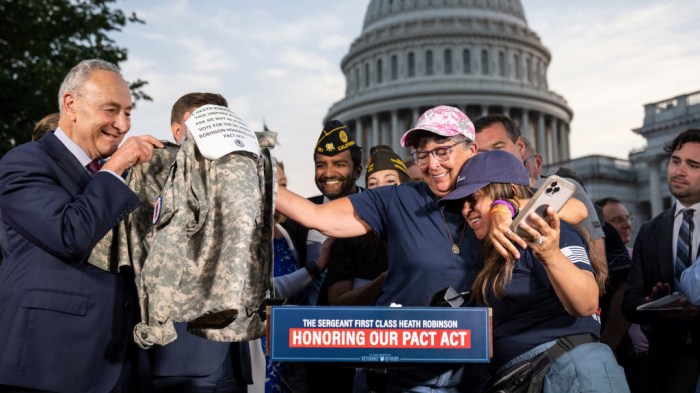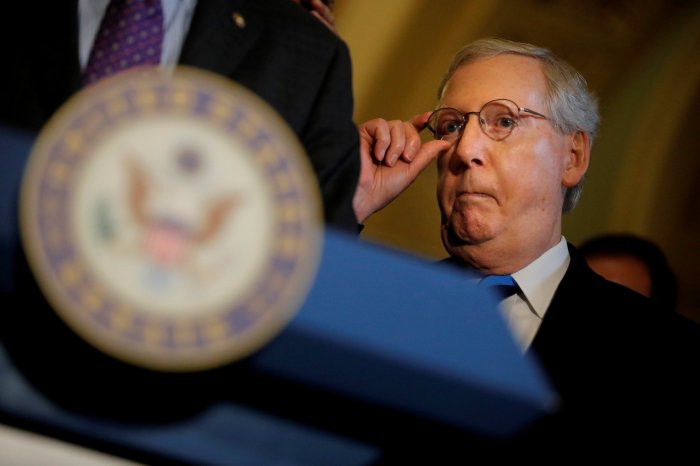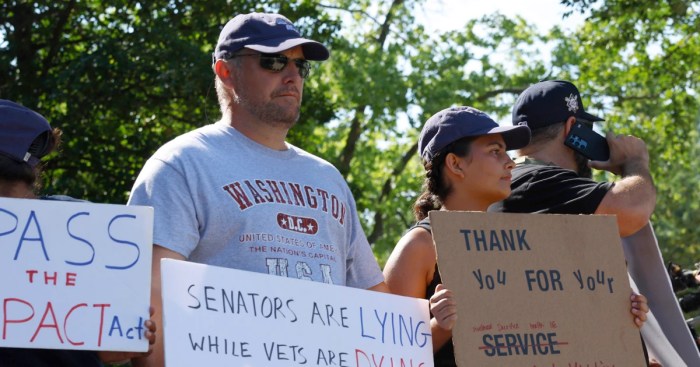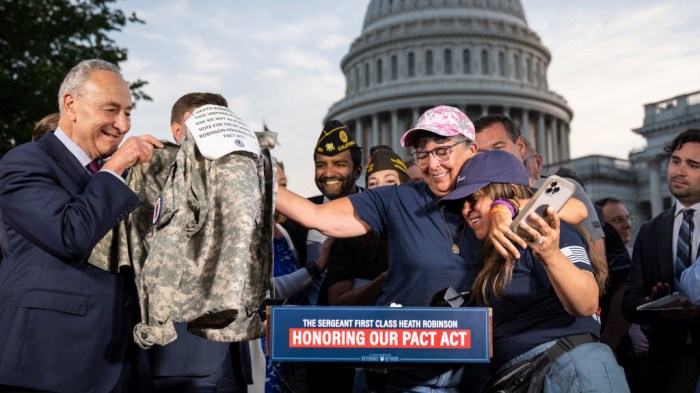
Senate Passes Burn Pit Legislation to Expand Veteran Health Care
Senate Passes Burn Pit Legislation to Expand Veteran Health Care, a landmark bill that promises to significantly improve the lives of countless veterans, has finally passed into law. This legislation represents a crucial step forward in addressing the health consequences of burn pit exposure, a persistent problem that has plagued veterans for years.
The bill aims to expand access to healthcare for veterans who have been diagnosed with conditions linked to burn pit exposure, providing them with the medical care they desperately need. This legislation is a testament to the unwavering dedication of lawmakers and veterans’ advocates who have fought tirelessly for years to ensure that veterans receive the support they deserve.
The legislation tackles a range of issues, including expanding the list of conditions covered by the VA, streamlining the claims process, and increasing funding for research into burn pit exposure. The bill also includes provisions to improve the communication and coordination between the VA and veterans’ organizations, ensuring that veterans receive timely and accurate information about their benefits and resources.
The Burn Pit Legislation
The Senate’s passage of the PACT Act, officially known as the Sergeant First Class Heath Robinson Honoring Our Promise to Address Comprehensive Toxics (PACT) Act of 2022, marks a significant step towards providing vital healthcare for veterans exposed to burn pits during their service.
This legislation represents a culmination of years of advocacy by veterans and their families who have suffered from illnesses linked to exposure to these toxic substances.
Key Provisions of the PACT Act
The PACT Act establishes a framework for addressing the health needs of veterans exposed to burn pits and other toxic substances during their service. The legislation includes several key provisions, including:
- Presumptive service connection for 23 respiratory illnesses and 11 types of cancer, recognizing the link between burn pit exposure and these conditions.
- Expansion of the VA’s health care system to provide specialized care for veterans with burn pit-related illnesses.
- Increased funding for research on the health effects of burn pit exposure.
- Streamlined claims process for veterans seeking benefits for burn pit-related illnesses.
Health Conditions Covered Under the PACT Act
The PACT Act specifically addresses a wide range of health conditions that have been linked to burn pit exposure. These include:
- Respiratory illnesses: Asthma, bronchiectasis, chronic obstructive pulmonary disease (COPD), interstitial lung disease, lung cancer, mesothelioma, pleural plaques, and sarcoidosis.
- Cancers: Brain cancer, breast cancer, colon cancer, esophageal cancer, kidney cancer, leukemia, liver cancer, lymphoma, multiple myeloma, pancreatic cancer, and prostate cancer.
Expansion of Veteran Health Care Access
The PACT Act expands access to veteran health care by:
- Providing presumptive service connection for certain health conditions, making it easier for veterans to receive benefits.
- Establishing specialized burn pit clinics within the VA to provide comprehensive care for veterans with burn pit-related illnesses.
- Increasing funding for research on the health effects of burn pit exposure, leading to better understanding and treatment options.
The Impact on Veterans

This legislation represents a significant step forward in recognizing the health challenges faced by veterans exposed to burn pits and ensuring they receive the care they deserve. The bill aims to expand access to healthcare, improve diagnostic capabilities, and provide long-term support for veterans affected by burn pit exposure.
Benefits for Veterans Exposed to Burn Pits
The legislation will provide numerous benefits for veterans who were exposed to burn pits during their service. These benefits include:
- Presumptive Service Connection:The legislation establishes a presumption of service connection for certain respiratory illnesses, cancers, and other health conditions linked to burn pit exposure. This means that veterans will no longer have to prove that their illnesses were directly caused by burn pit exposure.
Instead, they will be eligible for VA benefits based on their service history and exposure to burn pits. This simplifies the claims process and ensures that veterans receive the benefits they deserve.
- Expanded Healthcare Access:The bill expands access to healthcare services for veterans exposed to burn pits, including screenings, diagnosis, and treatment for conditions related to burn pit exposure. This includes providing access to specialized medical care, such as pulmonology, oncology, and mental health services.
It’s great to see the Senate passing burn pit legislation to expand veteran health care. It’s a critical step in addressing the long-term health consequences of exposure to these toxic substances. Meanwhile, on a separate but equally important front, congressional Democrats are asking the DNI to conduct an immediate assessment of national security damage, as reported in this article.
It’s vital to protect our national security, and these assessments are essential to ensuring our safety. Ultimately, the passage of burn pit legislation is a positive step, and we need to continue addressing these issues that affect our veterans and national security.
- Increased Research Funding:The legislation dedicates funding for research into the long-term health effects of burn pit exposure. This research will help scientists better understand the health risks associated with burn pit exposure and develop more effective treatments for veterans affected by these conditions.
It’s great to see the Senate passing legislation to expand veteran health care, especially addressing the issue of burn pits. It’s about time we take care of those who served our country, and it’s refreshing to see progress being made.
It reminds me of when FedEx announced they would finally start tracking packages in real-time , a move that seemed so obvious it was surprising it took so long! Hopefully, this new legislation will have a similarly positive impact on the lives of our veterans.
Experiences of Veterans Affected by Burn Pit Exposure
The experiences of veterans affected by burn pit exposure are deeply personal and often heartbreaking. Many veterans have faced years of illness and struggle to obtain the care they need.
“I served in Iraq and was exposed to burn pits every day. I started getting sick a few years after I came home. I have trouble breathing, I’m constantly tired, and I have a lot of pain. It’s been a long and difficult journey to get the care I need.”
John, a veteran who served in Iraq.
The legislation aims to ensure that veterans like John receive the support and care they need.
Addressing Long-Term Health Consequences
The legislation recognizes the long-term health consequences of burn pit exposure and aims to provide veterans with the resources they need to manage their conditions. This includes:
- Long-Term Care:The bill provides for long-term care services for veterans affected by burn pit exposure. This includes access to rehabilitation services, home healthcare, and other support services.
- Mental Health Support:The legislation acknowledges the mental health challenges faced by veterans exposed to burn pits and provides access to mental health services, including counseling, therapy, and support groups.
- Research and Monitoring:The bill encourages ongoing research into the long-term health effects of burn pit exposure and establishes a system for monitoring the health of veterans exposed to burn pits. This will help ensure that veterans receive the care they need and that the VA can adapt its services to meet their evolving needs.
The Political Landscape: Senate Passes Burn Pit Legislation To Expand Veteran Health Care

The passage of the PACT Act, addressing health concerns linked to burn pits, reveals a complex interplay of political motivations, partisan responses, and stakeholder engagement. This legislation, while seemingly straightforward in its goal of expanding veteran healthcare, reflects a multifaceted political landscape where concerns about veterans’ health intersect with broader political agendas.
Political Motivations
The PACT Act, passed with bipartisan support, demonstrates a confluence of political motivations. While a shared concern for veterans’ well-being served as a common ground, partisan considerations also played a role. For many lawmakers, particularly those with veteran constituents, supporting the legislation was a matter of representing their constituents’ needs and ensuring adequate care for those who served.
The Senate’s recent passage of legislation expanding veteran health care to address the impacts of burn pits is a crucial step towards recognizing the sacrifices made by our service members. It’s a stark reminder of the long-lasting consequences of war, and it’s heartbreaking to hear about the closure of New York City’s 9/11 Tribute Museum , a place that served as a powerful testament to resilience and remembrance.
The need for continued support for veterans and their families remains paramount, and this legislation offers a glimmer of hope for those who have borne the invisible wounds of war.
Responses from Different Political Parties
The PACT Act garnered bipartisan support, with both Democrats and Republicans voting in favor of the legislation. However, the initial vote on the bill in June 2022 saw some Republicans voting against it, raising concerns about the bill’s cost and potential for bureaucratic expansion.
These concerns, though ultimately overcome, highlighted the political complexities surrounding veteran healthcare legislation.
Key Stakeholders
The PACT Act’s passage was driven by the advocacy efforts of various stakeholders. Veterans’ organizations, such as the Veterans of Foreign Wars (VFW) and the American Legion, played a crucial role in raising awareness about the health risks associated with burn pits and lobbying for expanded healthcare coverage.
Furthermore, advocacy groups dedicated to veterans’ health, like the Iraq and Afghanistan Veterans of America (IAVA), contributed significantly to the bill’s passage.
The Future of Veteran Health Care
The passage of the burn pit legislation marks a significant step forward in addressing the health needs of veterans exposed to toxic substances. However, the true impact of this legislation on veteran health care will unfold over time, requiring ongoing attention and adaptation to meet the evolving needs of veterans.
The Long-Term Impact of the Legislation
This legislation represents a crucial acknowledgment of the health challenges faced by veterans exposed to burn pits and other toxic substances during their service. By expanding access to VA healthcare, the legislation provides a foundation for addressing the long-term health consequences associated with these exposures.
The long-term impact will depend on several factors, including:
- The effectiveness of the VA in diagnosing and treating burn pit-related illnesses.
- The availability of resources and expertise to address the growing number of veterans seeking care.
- The continued research and development of new treatments and technologies for burn pit-related illnesses.
A Hypothetical Scenario of the Future
Imagine a scenario where the VA has effectively implemented the burn pit legislation. Veterans exposed to toxic substances can readily access specialized care, receive timely diagnoses, and benefit from innovative treatments. The VA has established dedicated burn pit clinics, staffed with medical professionals trained in diagnosing and treating burn pit-related illnesses.
Research efforts are ongoing to develop new diagnostic tools and therapies, improving the quality of care and the lives of veterans. This scenario highlights the potential for the legislation to significantly improve the health outcomes of veterans exposed to toxic substances.
Challenges and Opportunities for Improving Veteran Health Care
The future of veteran health care presents both challenges and opportunities.
- Challenges:
- The VA faces the challenge of addressing the backlog of claims related to burn pit exposure, ensuring veterans receive timely benefits and care.
- The long-term health effects of burn pit exposure are still being understood, requiring ongoing research and monitoring to develop effective treatments.
- The VA must continue to adapt its services and resources to meet the diverse needs of a growing veteran population.
- Opportunities:
- The burn pit legislation creates an opportunity for the VA to invest in research and development, leading to advancements in diagnosis, treatment, and prevention of burn pit-related illnesses.
- This legislation can serve as a catalyst for greater collaboration between the VA, the Department of Defense, and other stakeholders to address the health needs of veterans.
- The passage of this legislation highlights the importance of public awareness and advocacy in supporting veteran health care.
- Respiratory illnesses:Burn pit smoke contains particulate matter, carbon monoxide, and other respiratory irritants that can trigger asthma, chronic obstructive pulmonary disease (COPD), and lung cancer. Exposure can also lead to chronic bronchitis and pneumonia.
- Cardiovascular disease:The toxins in burn pit smoke can damage blood vessels and increase the risk of heart attacks, strokes, and other cardiovascular diseases.
- Cancer:Studies have linked burn pit exposure to an increased risk of various cancers, including lung cancer, mesothelioma, and certain types of leukemia.
- Neurological disorders:Exposure to toxic chemicals in burn pit smoke may lead to neurological problems like Parkinson’s disease, Alzheimer’s disease, and traumatic brain injury.
- Reproductive health issues:Some studies suggest that burn pit exposure may contribute to infertility and birth defects.
- Mental health conditions:The stress of deployment, combined with the potential health effects of burn pit exposure, can lead to post-traumatic stress disorder (PTSD), anxiety, and depression.
- A 2019 study published in the journal -Environmental Health Perspectives* found a strong association between burn pit exposure and respiratory illnesses, cardiovascular disease, and cancer in veterans.
- A 2020 study by the National Academies of Sciences, Engineering, and Medicine concluded that there is “sufficient evidence” to support a link between burn pit exposure and respiratory illnesses, cancer, and mental health conditions.
- The Department of Veterans Affairs (VA) has recognized the link between burn pit exposure and health problems and has established a program to provide healthcare to veterans who have been exposed.
The Science of Burn Pit Exposure

Burn pits, large open-air fires used to dispose of waste on military bases, have become a significant concern for veterans’ health. The smoke and ash generated by these pits contain a cocktail of toxic chemicals that can be inhaled and absorbed into the body, posing serious health risks.
Health Risks Associated with Burn Pit Exposure
The health risks associated with burn pit exposure are extensive and complex. The specific health conditions an individual may develop depend on the duration and intensity of exposure, the types of materials burned, and individual susceptibility.
Common Health Conditions Linked to Burn Pit Exposure, Senate passes burn pit legislation to expand veteran health care
Scientific Evidence Supporting the Link
Numerous studies have investigated the link between burn pit exposure and health problems. Here are some key findings:

